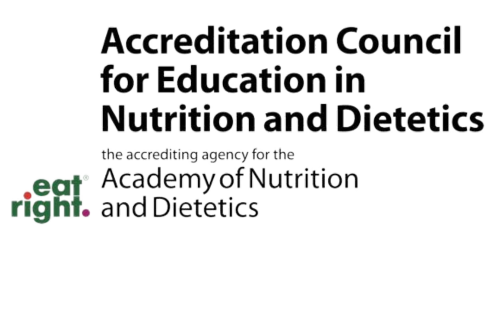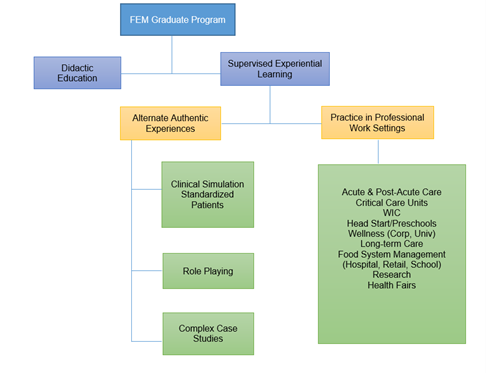Integrated Graduate Nutrition Program (M.S.) – Fully Online
Fast-Track Your Career with UNF's Online Integrated Graduate Nutrition Program
The Integrated Graduate Program in Nutrition and Dietetics at the University of North Florida is a 20-month program that prepares students to take the Commission on Dietetic Registration (CDR) credentialing examination to become a Registered Dietitian Nutritionist. The program integrates online didactic coursework with 1000 hours of onsite supervised experiential learning in a competency-based curriculum designed to prepare nutrition and dietetics practitioners for future practice.

Upcoming Events

The Integrated Graduate Program in Nutrition and Dietetics has been granted accreditation under the newly released Future Education Model Standards by:
The Accreditation Council for Education in Nutrition and Dietetics (ACEND) of the Academy of Nutrition and Dietetics Association (formerly known as the American Dietetic Association)
120 South Riverside Plaza, Suite 2190
Chicago, IL 60606-6995
Phone: (312) 899-0040 ext. 5400
Email: acend@eatright.org
Website: www.eatrightpro.org/acend
Application Deadlines
| Jan. 15 |
READY TO UNLEASH YOUR POTENTIAL WITH UNF?
Program Information
-
Program Mission, Goals, and Objectives
Program Mission Statement
To prepare culturally competent and proficient Registered Dietitian Nutritionists with increased competence and advanced skills in clinical and community nutrition and leadership with rigorous, cutting-edge graduate didactic coursework integrated with impactful supervised experiential learning to advance and advocate for the practice of nutrition and dietetics.
Program Goals and Objectives
The Integrated Graduate Program in Nutrition and Dietetics is designed to prepare students to practice competently in an increasingly complex health care environment with the skills and knowledge who take an evidence-based approach to practice. The Integrated Graduate Program in Nutrition and Dietetics learning objectives will ensure:
- Graduates will enter the dietetics professions as culturally competent, proficient Registered Dietitian Nutritionists.
- Graduates will become leaders of the profession and advocate for nutrition and dietetics amongst the community and other professions.
Goal One: Graduates will enter the dietetics profession as culturally competent, proficient Registered Dietitian Nutritionists.
- Program Objectives for Goal One
- 1.1 “At least 80% of program graduates complete program/degree requirements within 3 years (150% of the program length)”.
- 1.2 “Of graduates who seek employment, 80 percent are employed in nutrition and dietetics or related fields within 12 months of graduation”.
- 1.3 “80 percent of program graduates take the CDR credentialing exam for dietitian nutritionists within 12 months of program completion”.
- 1.4 “The program’s one-year pass rate (graduates who pass the registration exam within one year of the first attempt) on the CDR credentialing exam for dietitian nutritionists is at least 80%”.
- 1.5 “Of employers who return the employer survey, 80% will rate the graduates’ overall entry-level competence as “satisfactory” or “above satisfactory”.
- 1.6 “At least 80% of graduates who return the annual graduate survey will agree that the preparation provided by the program for entry-level practice was at least “satisfactory”.
- 1.7 “At least 80% of program graduates who return the annual graduate survey will report that they utilize cultural competency skills in making food and nutrition recommendations.”
Goal Two: Graduates will become leaders of the profession and advocate for nutrition and dietetics amongst the community and other professions.
- Program Objectives for Goal Two
- 2.1 Of program graduates who return the annual graduate survey, at least 80% will report that they hold a leadership position in a professional organization, work setting, or community.
- 2.2 Of program graduates who return the annual graduate survey, at least 80% will report that they are active members of at least one professional organization.
Pass Rate Data Outcomes Year Graduation Rate One-Year Pass Rate on CDR RDN Exam 2024 100% Rate not available 2025 100% Rate not available UNF’s Integrated Graduate Program in Nutrition and Dietetics has an ongoing assessment process on the outcomes of the program. Data on outcomes are available on request. To obtain information on available program outcomes, send a written request to the Program Director: Dr. Jamisha Leftwich at j.leftwich@unf.edu.
-
Admission Requirements
Program Admission Requirements:
Applicants must meet the following admission requirements:
- Completion of one of the following:
- With a verification statement from a didactic program in dietetics (DPD).
- A “Verification Statement” or “Declaration of Intent” to complete form must be submitted in student’s application to show evidence of DPD enrollment. A “Verification Statement” must be provided by the time of enrollment.
- With a bachelor’s degree in another discipline completed at any accredited institution and all the Integrated Graduate Nutrition Program Prerequisite Courses listed below:
- General chemistry,
- Bioorganic chemistry OR Organic Chemistry
- Anatomy/physiology I & II,
- Microbiology,
- College algebra,
- Social science such as Intro to Psychology or Intro to Sociology,
- Basic Principles of Nutrition, and
- Food Science and lab or equivalent
- With a verification statement from a didactic program in dietetics (DPD).
Both DPD students and non-DPD students must meet the following admission requirements:
- Cumulative GPA of 3.0 from the last 60 credits taken in a bachelor’s degree
- All Integrated Graduate Nutrition Program Prerequisite Courses must be completed with a minimum grade of “C” and not be older than ten years.
For University and International requirements and more information on how to apply, please visit
- Completion of one of the following:
-
Application Requirements
Application Requirements
The application process for the program consists of two steps.
Step 1: Apply through the Dietetic Internship Centralized Application Services (DICAS)
Applicants must submit their application via the DICAS website at https://dicas.cas.myliaison.com/applicant-ux/#/login. The DICAS application fee is $50 for the first application and $25 for each additional application. Your DICAS application must include the following:
- Personal statement. Submit a one-to-two-page letter of personal introduction and professional intent. Your statement should include:
- The reason you are interested in becoming a Registered Dietitian Nutritionist.
- Your professional career goals and how the University of North Florida Graduate Program aligns with these goals.
- If applicable, your identification as a member of a diverse or historically underrepresented group as defined by the Academy of Nutrition and Dietetics.
- If applicable, your experience working with individuals from a diverse or historically underrepresented group as defined by the Academy of Nutrition and Dietetics.
- Resume Submit a current resume detailing paid and volunteer experience, research activities, and awards and/or scholarships received. Applicants are encouraged to have work and/or volunteer experience in areas related to nutrition, health, fitness, or public health.
- Transcripts. Submit official transcripts from all colleges and universities attended that contributed to your baccalaureate degree, as well as transcripts documenting completion of the prerequisite courses (see Admission Requirements above). If you are enrolled in a prerequisite course during the semester you apply, include proof of enrollment in the final prerequisite courses.
- Letters of Recommendation. Provide three professional references who will submit recommendation forms through the DICAS application portal on your behalf. At least one reference must be a faculty member, and at least one must be a supervisor or manager. The third reference may be either a faculty member or a supervisor/manager. Applicants are encouraged to request letters of recommendation from faculty and supervisors at least three to four weeks before the application deadline.
Step 2: Apply to the University of North Florida Graduate School
Submit your application to the UNF Graduate School along with a non-refundable $30 application processing fee, which is paid online at the time of submission.
Important: Both applications must be completed to be considered for admission to the program. The application deadline for the Fall cohort is January 15.
Note: Standardized tests, including the GRE, are not required for admission to the Integrated Graduate Program.
- Personal statement. Submit a one-to-two-page letter of personal introduction and professional intent. Your statement should include:
-
Competency-Based Education
The Integrated Graduate program in Nutrition and Dietetics is a competency-based education (CBE) program that measures learning by how well a student demonstrates the ACEND® Future Education Model (FEM) Graduate Degree Competencies, which define the minimum level of proficiency needed of nutrition and dietetics practitioners to function successfully in practice. The Graduate Degree Competencies describe the essential synthesis of knowledge, skills, abilities, behaviors, and other characteristics in the seven units described below:
Competencies Unit Future Education Model Graduate Degree Competencies 1-Foundation Knowledge Applies foundational sciences to food and nutrition knowledge to meet the needs of individuals, groups, and organizations. 2-Client/Patient Services Applies the integrates client/patient-centered principles and competent nutrition and dietetics practice to ensure positive outcomes. 3-Food System Management Applies food system principles and management skills to ensure safe and efficient delivery of food and water. 4-Community & Population Health Nutrition Applies community and population nutrition health theories when providing support to community or population nutrition programs. 5-Leadership, Business, Management, & Organization Demonstrates leadership, business and management principles to guide practice and achieve operational goals. 6 -Critical Thinking, Research, & Evidence-Informed Practice Integrates evidence-informed practice, research principles, and critical thinking into practice. 7-Core Professional Behaviors Demonstrates professional behaviors and effective communication in all nutrition and dietetics interactions.
Competencies are covered repeatedly throughout the curriculum and build on previous knowledge and experience to progress from introductory to more advanced learning activities, thus providing students multiple opportunities to achieve the competencies at the expected depth and breadth of the competency.Knows, Shows, Does
Another key tenet of CBE is that competence goes beyond just knowing information, but rather the student shows how to apply the knowledge or does so by performing it in practice. These levels of performance [knows (K), shows (S), does (D)] are designated for each competency and performance indicator by ACEND®. This is why supervised experiential learning are such an important part of the Graduate Program, as students are showing they can apply their knowledge and demonstrate competence.
Image Alt Text: Image Source: ACEND Competency-based Education Training Based on Miller's Pyramid of Clinical Competence. Top section of pyramid: Green section labeled "Does". Description: Daily patient care: assessed by direct observation in clinical settings (performance). Second layer of pyramid: Purple section labeled "Shows how". Description: demonstration of clinical skills: tested by OSCE, standardized patients, clinical exams, etc. (Competency). Third layer of pyramid: Orange section labeled "Knows how". Description: Application of knowledge tested by clinical problem solving, etc. Base section of pyramid: yellow section labeled "Knows". Description: Knowledge: tested by written exams. Two red multi-directional arrows to the left of the pyramid. One labeled Cognition at the base of the pyramid, the other labeled Behavior at the top of the pyramid.
Assessment of Student Learning and Competence
As is characteristic of CBE, attainment of competence occurs over time and may differ for each student. Assessment of student learning and competence is ongoing (formative and summative) so that feedback to the student is frequent and student-centered to support success throughout the program.
-
Supervised Experiential Learning and Performance Indicators
Performance Indicators are defined by ACEND® for each competency that provide measurable, observable criteria of what competence actually looks like in practice. Learning activities are then planned based on these performance indicators to assess the student’s progress towards achievement of competence.
In CBE, supervised experiential learning is especially important, as students have the chance to practice new skills with hands-on learning, or as it is often described: “learning by doing.” The Integrated Graduate Program in Nutrition and Dietetics plans 1000 hours of supervised experiential learning, comprising of 660 hours in Professional Work Setting rotations and 340 hours in didactic courses. UNF affiliates with supervised experiential learning sites throughout Florida and some out-of-state facilities. The Integrated Graduate Program in Nutrition and Dietetics is responsible for identifying SEL sites and preceptors and creates the rotation schedule for each student depending on site availability and student needs. It is not the responsibility of students to secure SEL placements. However, students are responsible for making arrangements for their housing and/or commuting plans to assigned clinical education sites, at the student’s expense. The figure below shows the types of learning activities planned:

Image Alt. Text: FEM Graduate Program Flow Chart. Top tier: Blue box labeled "FEM Graduate Program". Top tier breaks into two parts, purple box 1 labeled "Didactic Education", purple box 2 labeled "Supervised Experiential Learning". Purple Box 2 breaks into two parts, yellow box 1 labeled "Alternate Authentic Experiences", yellow box 2 labeled "Practice in Professional Work Settings". Yellow Box 1 breaks into three parts, green box 1 labeled "Clinical Simulation Standardized Patients", green box 2 labeled "Role Playing", green box 3 labeled "Complex Care Studies. Yellow box 2 breaks into 1 box, green box labeled "Acute & Post-Acute Care, Critical Care Units, WIC, Head Start/Preschools, Wellness (Corp, Univ.), Long-term Care, Food System Management (Hospital, Retail, School), Research, Health Fairs.
-
Course Plan
The Integrated Graduate Program in Nutrition and Dietetics is a full-time program with a cohort-based plan of study. Students are required to enroll full-time and must advance through a pre-determined curriculum in sequence with their cohort.
All courses are delivered in an online modality through the learning management system, Canvas, through UNF, and other online technologies such as Zoom. The information regarding the available resources is available on the UNF Technology for Students website.
Holidays and Vacations
The program will follow the University of North Florida calendar with university holidays and vacations observed. The university calendar can be assessed here: https://events.unf.edu/academic_calendar
Term: Year 1 Fall
Course Plan Course Supervised Experiential Learning Credits Food Service Management I Food Service Rotation 3 Advanced Medical Nutrition Therapy I 3 Nutrition and Metabolism 3 Term: Year 1 Spring
Course Plan Course Supervised Experiential Learning Credits Community Nutrition Community Nutrition Rotation 3 Research 3 Advanced Nutrition Counseling 3 Term: Year 1 Summer
Course Plan Course Supervised Experiential Learning Credits Socio-cultural Influences on Nutrition 3 Advanced Nutrition Concepts 3 Term: Year 2 Fall
Course Plan Course Supervised Experiential Learning Credits Clinical Nutrition Clinical Nutrition Rotation 3 Food Service Management II 3 Nutrition through the Lifespan 3 Term: Year 2 Spring
Course Plan Course Supervised Experiential Learning Credits Nutrition Education and Counseling Specialty Rotation 3 Seminar 3 Assessment of prior learning or experience
Advanced Placement
Advanced placement cannot be granted in the Program.
Credit by Examination
There is no credit by examination for courses taken at other institutions. All students must take all courses in the program and complete all supervised experiential learning in its entirety.
Transfer of Credit and Credit for Experiential Learning
Transfer of credit is not allowed.
The University of North Florida Integrated Graduate Program in Nutrition and Dietetics recognizes that not all learning occurs in the structured academic classroom. Rather, significant learning occurs through work responsibilities and employer or armed service training. Additionally, The Academy of Nutrition and Dietetics (AND) no longer requires that supervised experiential learning be the sole source of practical learning to qualify for the registered dietitian examination. AND now allows programs the flexibility to modify supervised experiences for individuals with extensive learning and professional competence in nutrition and dietetics and/or food service-related area acquired outside the academic setting. A graduate student may apply for credit towards supervised practice hours gained from a paid full-time position in nutrition and dietetics and/or food service-related area of at least six months. In addition, if a graduate student is a licensed nutritionist by their state, they may apply for credit towards supervised practice hours obtained through licensure. Policies and procedures related to prior learning assessment should be addressed to the Program Director.
Graduation and Program Completion
Program completion is reached when the student has successfully completed all coursework for the Master of Science degree in Nutrition (39 credits). A graduate student must have a cumulative UNF Graduate Program GPA of 3.0 or higher to be eligible for graduation and the award of a graduate degree. All required courses must be completed, and an overall "B" level performance is required in all courses.A verification statement is granted to students upon completion of the program requirements. Students must complete at least 700 hours of worksite supervised experiential learning (SEL) and SEL hours from courses for a total of at least 1,000 hours. In addition, students must achieve an adequate rating (4 or higher on a 1-5 scale) on each competency and performance indicator rating. Graduates who receive a verification statement are eligible to take the examination to become a registered dietitian. The CDR credentialing exam for dietitian nutritionists is administered by the Commission on Dietetic Registration (CDR) of the Academy of Nutrition & Dietetics (https://www.cdrnet.org/). -
Tuition and Fees
Up-to-date tuition and fees for students in the Integrated Graduate Program in Nutrition and Dietetics are available on UNF Tuition and Fees page.
Estimated Additional Expenses
Expenses and Associated Fees Expense Associated Fee (USD) Application Fee $30 Housing $15,080 Travel to Sites $3,200 Books $2,000 Health Insurance $150 Liability Insurance per year $35 Background Checks $139 Professional Membership $58 (per year) Technology $1,500 Testing Fees $100 Lab Coats $50 Total Estimated Costs $22,300 Financial Aid
The UNF One Stop Student Services can help students apply for Direct Unsubsidized Loans. Visit https://www.unf.edu/onestop/finaid/ for more information.
Scholarships, fellowships, and awards may also be available. Visit the Graduate School website at https://www.unf.edu/graduateschool/ and click award opportunities for more information.
Graduate assistantships are sometimes available within the department, depending on available funding. The Program Director will send a survey to applicants to gauge interest in department assistantships following the program application deadline. Students who complete the survey will be contacted if awarded a Graduate Assistantship.
-
Requirements to become a Registered Dietitian
The field of nutrition and dietetics is continually growing. According to the Bureau of Labor and Statistics, the projected growth from 2016-2026 is 15%. In 2020 the median pay for dietitians was $63,090 per year.
Dietitians are experts in the use of food and nutrition to promote health and manage disease. They work in a variety of settings including hospitals, health clinics, public health departments, and foodservice operations.
Beginning in 2024, a master’s degree will be required in order to gain candidacy to sit for the Registered Dietitian Nutritionist Examination. Upon successful completion of a Graduate Program accredited by the Future Education Model standards through ACEND (such as the Integrated Graduate Program in Nutrition and Dietetics at UNF) students are eligible to sit for the Registered Dietitian Nutritionist Examination.
The Integrated Graduate Program in Nutrition and Dietetics at UNF is a Graduate Program accredited under the Future Education Model standards by ACEND. A Graduate Program places training for registered dietitian nutritionists at the graduate level by providing didactic coursework and 1000 hours of supervised experiential learning. In this model, students can earn a bachelor’s degree in any field while completing pre-requisite courses that are required for most Graduate Programs in Nutrition and Dietetics. Traditional dietetics education pathways to becoming a Registered Dietitian Nutritionist are still available and these include:
- Completing an ACEND-accredited undergraduate Didactic Program in Dietetics, followed by a graduate-level ACEND-accredited dietetic internship program;
- Completing an ACEND-accredited coordinated program with didactic coursework and the dietetic internship combined into one program at the undergraduate level;
- Completing an ACEND-accredited coordinated program with the didactic coursework and dietetic internship combined into one program at the graduate level.*
- Pass a national examination administered by the Commission on Dietetic Registration (CDR). For more information regarding the examination, refer to the CDR Website.
- Obtain state licensure through an application process (in most states, including Florida). For more information about state licensure requirements, visit State Licensure Information Website.
For more information about educational pathways to become a RDN, visit the ACEND website.
*This is similar to a Graduate Program in Nutrition and Dietetics but follows slightly different accreditation standards.
Licensure
While state interpretations of statutes may vary, it is ACEND's considered opinion that the Integrated Graduate Program in Nutrition and Dietetics meets the educational requirements for dietetics licensure and certification in all states. However, completing an ACEND-accredited academic program alone does not qualify an individual for licensure or certification as a dietitian in any state. Individuals should review their state's licensing statutes and regulations to understand the specific requirements, including supervised practice and examinations, needed to obtain a dietetics license. More information about state licensure and certification can be found at this link: State Licensure.
Contact the Program Director

Integrated Future Graduate Program Director
j.leftwich@unf.edu
(904) 620-4288


